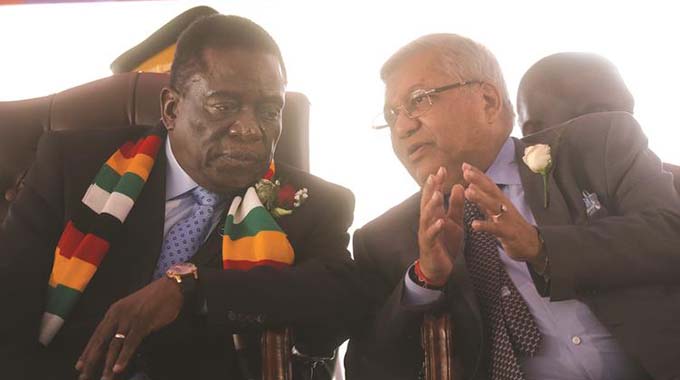Source: ‘Address forex access issues’ | The Herald December 10, 2019
President Mnangagwa listens as Indian billionaire Ravi Jaipuria makes a point during a conversation at the commissioning of Varun Beverages’ three new production lines on Friday last week Golden Sibanda Senior Business Reporter
Varun Beverages Zimbabwe’s billionaire Indian investor, Ravi Jaipuria, says the Government must address issues around access to foreign currency needed by industry for key raw material imports to make the country more attractive to foreign direct investment.While Zimbabwe has an active interbank market for forex, introduced in February this year after the market started experiencing shortage of dollars from 2016, firms requiring foreign currency to import critical imports find it difficult to get enough of it.
Mr Jaipuria said they had accepted the challenges in Zimbabwe and his company has registered significant success by managing the constraints, but he said limited access to foreign currency needed to import key raw materials was a huge challenge.
In an interview last Friday, after his company commissioned three new production lines at a ceremony officiated by President Mnangagwa, Mr Jaipuria said while he was not looking to repatriate dividends to India soon, the company required significant amounts of foreign currency to import raw materials.
The majority of companies operating in Zimbabwe have had to deal with an acute shortage of foreign currency they require for external payments, especially imports and debt servicing.
The Indian billionaire, one of the latest additions to the list of India’s top 100 billionaires with a net worth of about US$2 billion, said Varun Beverages Zimbabwe requires about US$3 million a month for key raw materials imports.
The firm’s soft drinks plant in Harare has freshly expanded capacity to manufacture 35 million bottles per month from 13 million bottles a month, which was installed when the plant was commissioned in June last year, which increases its appetite for forex.
Mr Jaipuria said the beverages maker, which produces a range of carbonated soft drink brands under PepsiCo franchise including Pepsi Cola, Mirinda, 7Up, Mountain Dew and Sting energy drink, is getting support from the Reserve Bank of Zimbabwe, Reserve Bank of India and also using own internal resources.
“I think the key thing is that Government has to give comfort and confidence to the investors that once they invest in this country, they will at least be able to get the raw materials to run their (factory) plants.
“Because if they are not able to get foreign exchange to run their plants then there will be nobody prepared to invest in this country.
“I think they have to give priority to manufacturing units and the people importing goods and trading because they are the people creating employment; that is the priority I think Government must give.
“We are getting support from (local) banks, we are getting some support from the Reserve Bank of India and whenever there is a shortfall our company (RJ Corp) steps in. During the tobacco season we get little extras; we are managing somehow.”
President Mnangagwa said Government will continue to create an enabling environment to ease the convenience and cost of doing business and ensure that the country is a safe, attractive and competitive investment destination.
The Zimbabwean market was awash with foreign currency after inflation forced dollarisation in 2009, but an increasing appetite for imports amid low domestic production, has caused acute shortage of hard currency, including from the interbank market.
Mr Jaipuria said they made a decision to invest in Zimbabwe at the recommendation of Pepsi International after the American beverages giant noted that the only major player in the industry then, Delta Corporation, had near monopoly of the market.
He said the Zimbabwean market quickly embraced their range of products, as soon as they hit the market as imported products from Zambia, which prompted the company to consider building a plant in the country to serve the domestic market.
Mr Jaipuria said the new production capacity of its factory gives the company latitude to export and earn foreign currency that the company requires for imported raw materials. The company is targeting exports to Zambia, Mozambique, Botswana and Malawi.
Newer Post
SA investor makes bribery claims Older Post
Prospect gets 5-year tax break 
COMMENTS
Forex or USD’s has been short in ZW for well over 50 years comrades. The reason for it is that the RBOZ and before that the Reserve Bank of Rhodesia tried to rig the currency rate to unsustainable levels.
So long as ZW has exchange control and plays cunning games with a rigged rate progress in ZW is doomed.
Only hope for ZW is to adopt the USD fully and forget about the silly RTGS dollar or whatever one might like to call it.